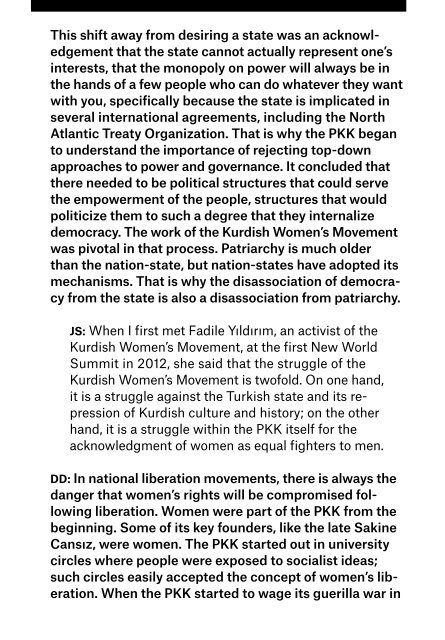Stateless Democracy
NWA5-Stateless-Democracy1.pdf?utm_content=buffer7beda&utm_medium=social&utm_source=twitter
NWA5-Stateless-Democracy1.pdf?utm_content=buffer7beda&utm_medium=social&utm_source=twitter
You also want an ePaper? Increase the reach of your titles
YUMPU automatically turns print PDFs into web optimized ePapers that Google loves.
This shift away from desiring a state was an acknowledgement<br />
that the state cannot actually represent one’s<br />
interests, that the monopoly on power will always be in<br />
the hands of a few people who can do whatever they want<br />
with you, specifically because the state is implicated in<br />
several international agreements, including the North<br />
Atlantic Treaty Organization. That is why the PKK began<br />
to understand the importance of rejecting top-down<br />
approaches to power and governance. It concluded that<br />
there needed to be political structures that could serve<br />
the empowerment of the people, structures that would<br />
politicize them to such a degree that they internalize<br />
democracy. The work of the Kurdish Women’s Movement<br />
was pivotal in that process. Patriarchy is much older<br />
than the nation-state, but nation-states have adopted its<br />
mechanisms. That is why the disassociation of democracy<br />
from the state is also a disassociation from patriarchy.<br />
JS: When I first met Fadile Yıldırım, an activist of the<br />
Kurdish Women’s Movement, at the first New World<br />
Summit in 2012, she said that the struggle of the<br />
Kurdish Women’s Movement is twofold. On one hand,<br />
it is a struggle against the Turkish state and its repression<br />
of Kurdish culture and history; on the other<br />
hand, it is a struggle within the PKK itself for the<br />
acknowledgment of women as equal fighters to men.<br />
DD: In national liberation movements, there is always the<br />
danger that women’s rights will be compromised following<br />
liberation. Women were part of the PKK from the<br />
beginning. Some of its key founders, like the late Sakine<br />
Cansız, were women. The PKK started out in university<br />
circles where people were exposed to socialist ideas;<br />
such circles easily accepted the concept of women’s liberation.<br />
When the PKK started to wage its guerilla war in<br />
1984 and its grassroots element began to take full force,<br />
many people from the villages and rural areas — people<br />
with little to no education — joined the struggle. The<br />
presence of people from different socioeconomic backgrounds<br />
exposed many class divisions at the early stage<br />
of the movement. Moreover, due to their different backgrounds,<br />
the people who came from the villages were<br />
more reluctant to accept women as equals to men.<br />
As a result, women were pushed a big step back. While in<br />
the beginning the mobilization was very ideological and<br />
theoretical, when the war intensified, its ideological and<br />
educational elements were often pushed to second place.<br />
At that time, women actually began to cut their hair very<br />
short to appear more masculine: the idea was to copy<br />
men in order to prove that they were equally capable.<br />
In the nineties, with encouragement from Öcalan, women<br />
who experienced discrimination within their own ranks<br />
began to mobilize. Öcalan has always been supportive<br />
of women’s liberation and has contributed significantly<br />
to the theoretical justifications around the autonomous<br />
organization of women within the PKK. Because of this,<br />
however, he has also faced opposition. The nineties saw<br />
the initiation of the Kurdish Women’s Movement, but in<br />
the last ten years, the movement has gained much more<br />
strength. Contradictions such as class divisions have<br />
been tackled and new approaches towards women’s liberation<br />
have been adopted in order to transform women’s<br />
liberation from an elitist ideal to a grassroots cause.<br />
In 2004 the PKK experienced a major backlash, with<br />
many people actually talking about the end of the organization.<br />
This was at the same time when major international<br />
offensives against the PKK began. Furthermore,<br />
38–39


